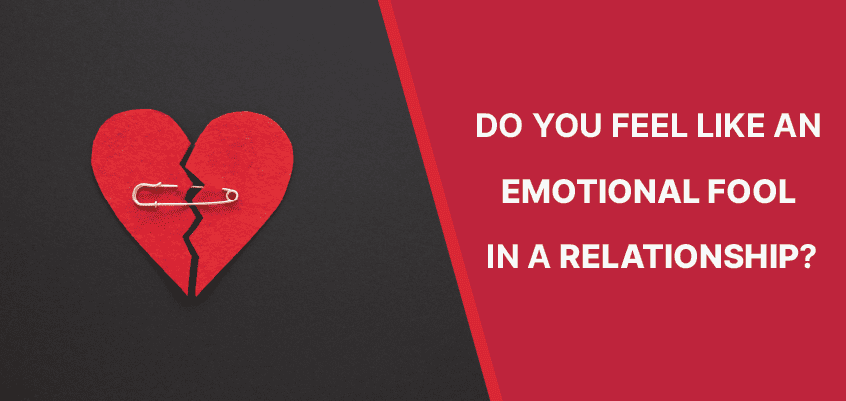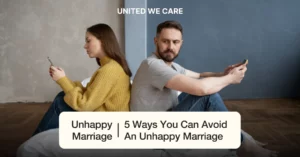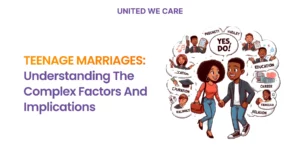Introduction
Those who tend to feel strongly and deeply are often called emotional fools. It is because their tendency to feel strongly often lands in situations where they get hurt, feel vulnerable, and feel trapped. If you feel the same way, read on to understand what is happening.
What does the term “emotional fool” in a relationship mean?
When interacting with others, the term “emotional fool” is usually given to someone emotionally sensitive or overly emotional. According to Karyn Hall, emotionally sensitive people are “those who experience intense emotions more frequently and for longer periods than most people do” [1].
These individuals have had a childhood or past where they may have developed low self-esteem and invalidation. Characteristics of Emotionally sensitive people involve [1] [2] [3]:
- High emotional reactivity to situations in the environment
- Tendency to feel both positive and negative emotions deeply
- Higher sensitivity to other’s emotions
- Increased tolerance of others’ actions, even when they are negative
- Occasional feelings of exhaustion with emotions and other people
- Sensitivity to rejection
- Difficulty making decisions
- Preference for intuitive thinking
- And a strong sense of justice
In relationships, this can create a situation where the sensitive person cares more for others, cannot tolerate conflicts, and gets disturbed even by small interactions. It may also make them feel as if they give more than they receive and, at times, get exhausted with the intensity of emotions they constantly feel, thereby feeling like a “fool.”
How to know if you become overly emotional in a relationship?
Before exploring whether you are or are not highly sensitive, it is essential to recognize that being highly emotional is not “wrong” or “foolish.” It is a response pattern that has both positive and negative outcomes. Terms like “emotional fool” are unhelpful and self-defeating, for they blame the person for something natural and a part of who they are.
In relationships, an overly sensitive person may be doing the following [1] [4]:
- Analyzing the other person’s behaviors and words
- Reacting strongly to small situations, comments, or criticisms
- Fearing that others would get hurt and modifying one’s behaviors
- Focusing on others’ problems more than on self
- Constantly feeling overwhelmed
- Feeling the constant need for reassurance
- Struggling with communicating clearly
The above may lead to multiple ups and downs in the relationship, as if on a roller coaster. Recognizing these patterns and finding ways to work on oneself to avoid adverse outcomes is essential.
What are the consequences of being emotionally sensitive in a relationship?
The pattern described above can have various positive and negative consequences. For instance, some people may find the emotional connection with their partners deep and satisfactory, and they may be able to empathize with their partner and develop a clear understanding.
However, there can also be negative consequences, which stem from an inability to process intense negative emotions and fear of hurting others. Karyn Hall gives two broad types of emotional sensitivity: emotional reactivity and avoidance. Both can have negative consequences [1]:
- Emotional Reactivity-related consequences: Sometimes emotional sensitivity looks like expressing emotions without waiting to think about products. In relationships, the sensitive partner may feel extremely angry or upset at a minor incident and react by blowing up or crying frequently. Such reactions may make the partners feel like they are walking on eggshells and reduce trust and connection between the two people.
- Emotional Avoidance related consequences: sometimes susceptible people wish to avoid negative emotions. They may suppress their true feelings, try to numb them by overeating or overexercising, and push feelings away. This avoidance often makes people avoid conflicts, difficult conversations, and setting boundaries, all of which are required for healthy relationships.
Emotional sensitivity often arises from low self-esteem. Thus, people with this trait may also require more validation and tend to analyze others. They feel rejected even with insignificant incidents, which might make the relationship exhausting for the partner and cause significant disturbances.
How to stop feeling like an “emotional fool” in a relationship when you are emotionally sensitive?
There are some steps To stop the pattern of responses. The first step is to recognize your patterns. In Hall’s book [1, she gives a checklist to determine whether you are overly sensitive, and completing this checklist along with other activities in her book can help. Once identified, your pattern-followed steps might be helpful.
- Take responsibility for your emotions: it is essential to recognize that emotions and emotional management are your jobs, not your partner’s. Reminding oneself of this responsibility can help manage emotional sensitivity positively. Pro tip: Try substituting labels like an emotional fool or sensitive with a reminder such as: “I am feeling this emotion strongly.” It increases a sense of control and reduces feelings of guilt and helplessness.
- Identify your Triggers: It is often difficult to establish why one feels so strongly. Thus, it is essential to note and map one’s emotional triggers. Pro Tip: Writing these triggers down can help in keeping track. One can start by noticing what they are feeling and then writing down what happened in the environment to cause this feeling.
- Learn Emotional Regulation Strategies: Emotional regulation involves managing emotional reactions to avoid outbursts—some strategies like mindfulness, guided visualization, connecting with nature, exercising, writing, etc. Pro Tip: Try different techniques and find which works best for you. Keep it ready for the next time you feel overly emotional.
- Learn to Set Boundaries: Sometimes, people may take advantage of your emotionally sensitive nature, and the fear of offending others may make you do things you don’t want. It is important to set healthy boundaries in a relationship so that you do not feel resentment later on. Pro Tip: Ask yourself what you would do if the risk of offending the other person were not there. The answer will usually reveal your true intention.
- Go deeper with your Healing: Often, the pattern of emotional sensitivity has roots in childhood. While it may be beneficial to seek self-help, it may be better to seek professional help, especially when you have noticed this pattern causing significant trouble in your life. Working with a qualified psychologist can help discover the underlying causes and find more effective ways to deal with one’s emotional sensitivity.
Conclusion
Being emotionally sensitive in a relationship is often wrongfully termed as being an “emotional fool.” While emotionally sensitive people often face difficulty in relationships due to the high intensity, frequency, and duration for which they feel emotions, it is possible to recognize one’s patterns and come out of them. One must identify triggers, learn emotional regulation, and set boundaries to overcome this pattern.
References
- K. D. Hall, The emotionally sensitive person: Finding peace when your emotions overwhelm you. Strawberry Hills, NSW: ReadHowYouWant, 2016.
- K. Wall, A. Kalpakci, K. Hall, N. Crist, and C. Sharp, “An evaluation of the construct of emotional sensitivity from the perspective of emotionally sensitive people,” Borderline Personality Disorder and Emotion Dysregulation, vol. 5, no. 1, 2018.
- “14 traits of susceptible people,” Psychology Today. [Online]. Available here: [Accessed: 19-Apr-2023].
- Person, “8 things to know about dating a compassionate person,” Healthline, 07-Apr-2021. [Online]. Available here:. [Accessed: 19-Apr-2023].
- M. Mukherjee, “Stop being an emotional fool – times of India,” The Times of India, 11-Dec-2014. [Online]. Available here: [Accessed: 19-Apr-2023].
- “The HSP relationship dilemma | Psychology Today.” [Online]. Available here: [Accessed: 19-Apr-2023].
Unlock Exclusive Benefits with Subscription
-
Premium Resources

-
Thriving Community

-
Unlimited Access

-
Personalised Support












